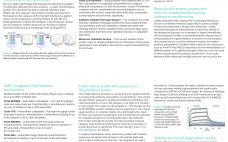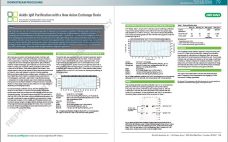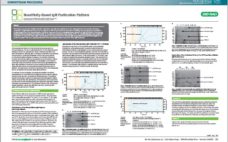Using the label-free optical technique of Bio-Layer Interferometry (BLI), the Octet platform provides real-time analysis of molecular interactions. It relies on the robust and easy-to-use Dip and Read™ format, which provides faster time to results relative to technologies like ELISA and SPR. It also operates in a fluidics-free format, thereby minimizing the complexity in analyte detection by fluidics-based technologies like SPR. It provides high-throughput analysis, with the option of analyzing to 96 samples simultaneously, thereby increasing analytical productivity. It has…
Author Archives: Payal Khandelwal
Acidic IgM Purification with a New Anion Exchange Resin
IgM antibodies are one of the fastest growing groups of diagnostic and therapeutic candidates. Unlike IgGs, IgMs cannot be purified by affinity chromatography due to their physiochemical properties. The large size of IgMs presents an additional purification challenge. Bio-Rad has developed a new strong anion exchange (AEX) resin — Nuvia HP-Q — to overcome the multiple issues faced when purifying large biomolecules. We show the purification of an acidic IgM antibody with capture purification using Nuvia HP-Q and polish purification…
Nonaffinity-Based IgM Purification Platform
The biological properties of IgM antibodies make them very effective vehicles for in vitro diagnostics and therapeutics. However, purification of IgM antibodies is far more complex than that for IgG antibodies. Furthermore, affinity chromatography is not ideal for purifying IgMs due to the required elution conditions. Here we propose a nonaffinity-based platform for IgM purification. This strategy utilizes a cation exchange (CEX) media, Nuviaâ„¢ S, for capture, and a mixed-mode media, CHTâ„¢, for polish purification. It is suitable for purification…
A Scalable Immobilized Metal Affinity Chromatography Resin for Process Purification
Downstream process purification of proteins requires a resin with optimized bead size for ideal pressure/flow properties and decent dynamic binding capacity (DBC) that provides production efficiencies and good process economics. Our newly developed metal chelate affinity resin — Nuvia™ IMAC — provides the mechanical strength, pore structures, ligand density, and particle size distribution required for an operation run at 300 cm/hr with a DBC of > 40 mg/ml at < 2 bar column backpressure. Protein purification can efficiently be scaled…




